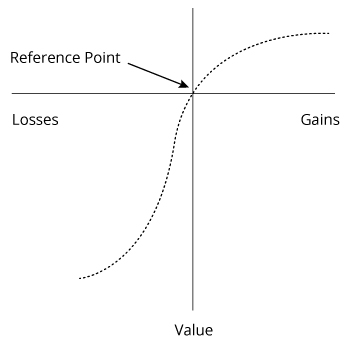Loss-aversion bias arises from feeling more pain from a loss than pleasure from an equal gain. Kahneman and Tversky focused on the difference in how we feel when we win or lose and how that affects our readiness to take risk. They found that individuals’ willingness to take a gamble (risk) was very different when facing a loss or a gain.
Value Function of Loss Aversion

Overconfidence bias occurs when market participants overestimate their own intuitive ability or reasoning. It can show up as illusion of knowledge where they think they do a better job of predicting than they actually do. Combined with self-attribution bias, individuals will take personal credit when things go right (self-enhancing) but blame others or circumstances for failure (self-protecting). While it is both cognitive and emotional, it is more emotional in nature because it is difficult for most individuals to correct and is rooted in the desire to feel good.
Self-control bias occurs when individuals lack self-discipline and favor immediate gratification over long-term goals. Self-control bias is evident when there is a conflict between short-term satisfaction and long-term goals. Often, individuals are not prepared to make short-term sacrifices to meet their long-term goals. The tendency for individuals to favor small payoffs now compared to larger payoffs in the future is known as hyperbolic discounting.
Status quo bias occurs when comfort with the existing situation leads to an unwillingness to make changes. If investment choices include the option to maintain existing choices, or if a choice will happen unless the participant opts out; status quo choices become more likely. Status quo bias is caused by the interaction of loss aversion bias, endowment bias, and regret aversion bias.
Endowment bias occurs when an asset is felt to be special and more valuable simply because it is already owned.
Regret-aversion bias occurs when market participants do nothing out of excess fear that actions could be wrong. They attach undue weight to actions of commission (doing something) and don’t consider actions of omission (doing nothing). Their sense of regret and pain is stronger for acts of commission.
